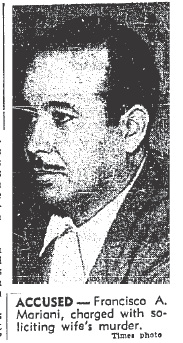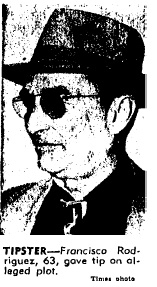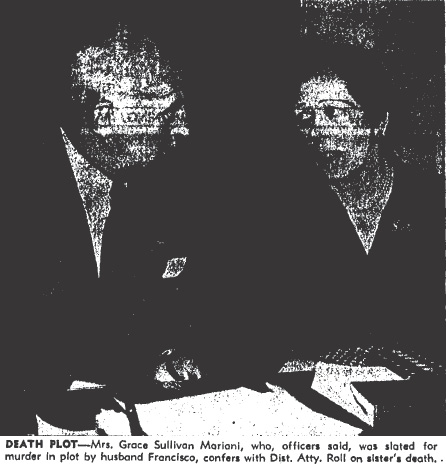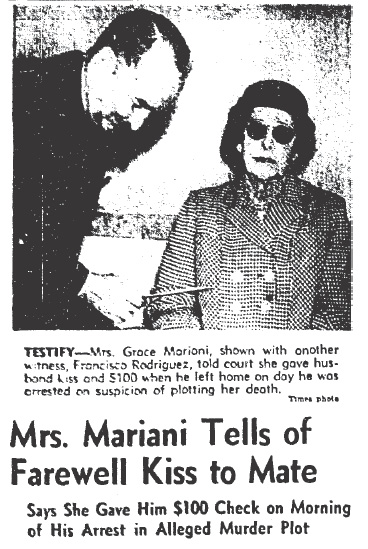 Grace had been married to Francisco Mariani for four months before L.A. County Sheriff’s detectives told her that he was soliciting a hitman to kill her. Her first reaction was to file for a divorce—she should have gone through with it. I’d say that hiring a hitman to kill you rates orders of magnitude higher than the customary grounds for divorce such as infidelity and mental cruelty. But inexplicably Grace had a change of heart and resolutely stuck by her man.
Grace had been married to Francisco Mariani for four months before L.A. County Sheriff’s detectives told her that he was soliciting a hitman to kill her. Her first reaction was to file for a divorce—she should have gone through with it. I’d say that hiring a hitman to kill you rates orders of magnitude higher than the customary grounds for divorce such as infidelity and mental cruelty. But inexplicably Grace had a change of heart and resolutely stuck by her man.
Grace’s friends thought she was mad. The evidence against Francisco was compelling. They advised her to cut herself loose from the “dapper Puerto Rican” as he’d been described in the newspapers. At Francisco’s preliminary hearing Grace testified that on the morning of March 25th she’d handed him $100 check made out to cash. He said he needed the money to pay the taxes on his secondhand furniture store at 2198 Fair Oaks Avenue in Altadena. He pocketed the check gave his wife a “farewell kiss” and left. Several hours later he was arrested in a Gardena gambling joint for masterminding the murder plot.
Here at Deranged L.A. Crimes we know the value of keeping your own counsel. Taking another person into your confidence when you’re planning homicide is a mistake which often leads directly to the green room at San Quentin. Don’t pass GO. Forfeit the insurance money, property and your freedom. It’s a sucker’s game—but greedy people are short-sighted and they rarely see past their own desires. According to Mariani’s friend, Francisco Rodriguez, on an auto trip to Stockton in mid-March Mariani told him he wanted to do away with Grace. In an act of love and trust, Grace had signed her property into joint tenancy with her new husband. Isn’t that what married couples do? As soon as the paperwork had been notarized the plot against her gained traction.
It may have seemed to Marriani that having friends in low places, like Rodriguez, was going to come in handy. Rodriguez said he knew of an ex-con who might do the job—then stalled Mariani by telling him the guy was in Chicago. Rodriguez promised to see the assassin on Monday, March 23rd and arrange a meeting—but instead he high-tailed it over to the Pasadena Police Department and ratted out his future former friend.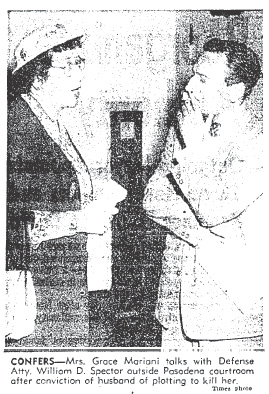
Pasadena cops weren’t prepared to undertake the investigation so they referred Rodriguez to the Sheriff’s Department. That’s how Sgt. Clarence Serrano ended up playing the part of a killer-for-hire.
Grace wasn’t the only person to testify at Mariani’s preliminary hearing—Sgt. Serrano also took the stand. Serrano described Mariani as “cool customer”. They’d met three times: the first time was at Rodriguez’s apartment on East Holly Street in Pasadena; then later that same day they met for a second time at Mariani’s home. While Grace was out shopping her husband gave Sgt. Serrano a tour of the home. The third meeting was held the next morning at a downtown Pasadena street corner and final arrangements were made while the two men drove around the city in Mariani’s car and discussed how and when Grace would die.
Serrano asked Mariani when he wanted the job done and was told “Today would be fine. In fact, 12:30 this noon would be a good time. My wife will be alone”. Mariani then handed Serrano one of his old ties to be used as garotte to strangle Grace. Ostensibly the motive for the crime would be robbery. Mariani gave the false hitman instructions to ransack the house to make it look convincing but admonished: “When you’re ransacking the house, don’t muss up my shirts.” The sight of his wife’s purple and bloated face in death would not be too much for the grieving widower to bear, but wrinkled shirts, that was another matter entirely.
As proof that “the job” was done Serrano was to bring Grace’s diamond ring to the Gardena poker parlor where Mariani would be establishing an alibi for the time of the murder.
When Serrano arrived at the Gardena gambling den he walked up to Mariani, who turned away from his card game for a moment, and asked: “Did you get the job done?” The deputy/hitman said “Yeah, man!” Mariani asked: “Did she scream?” Serrano replied: “No—but I had a little trouble. Hurry up and give me the money.” “Let me see the ring” Mariani demanded. That was when the other Sheriff’s detectives appeared and took Mariani to jail.
The D.A. was confident that he had enough evidence to take Mariani to trial. He couldn’t wait to get Sgt. Serrano on the stand to describe the conversations he’d had with Mariani about the murder. Even better Mariani had been recorded describing the plot in great detail to the would-be killer.
Mariani was held to answer for the plot against Grace, but he lucked out on the suspected poisoning of his sister-in-law. Grace had signed-off on the exhumation of her sister, Emeline Sullivan. The Frederick Newbarr, the coroner, had autopsied the body and found no evidence of strychnine. That was the only good news Mariani would get.
At his trial Mariani entered dual pleas of not guilty and not guilty by reason of insanity. He professed his undying love for Grace: “I’m still in love with my wife. I hope that this trial will bring out the true facts of the case, and that we can go back together again when it is over.” It remained to be seen if the jury of eleven women and one man would buy his story.
Even as the case against her husband grew stronger Grace told reporters: “I definitely feel he is innocent of trying to have me killed. I still love him.” Grace was finally permitted to visit her homicidal spouse. It was an emotional reunion—the two fell into each others arms and sobbed.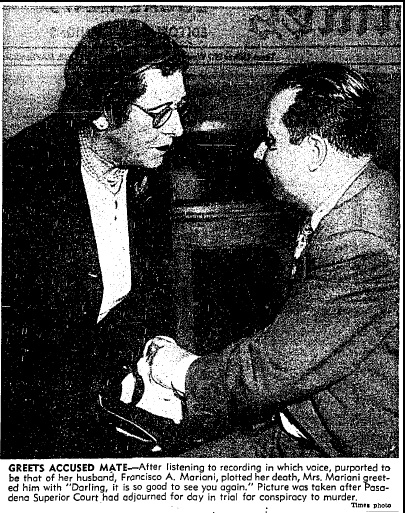
Grace made a surprise appearance at the trial on the day the wire recording of Mariani, coldly plotting her murder, was played. When she first entered the courtroom she darted over to the defense table, took her husband’s hands in her own and said: “Darling, it is so good to see you again.” On the recording jurors heard the softly accented voice of a Puerto Rican man as he complained to the hitman how difficult it was to hire a killer in L.A. County: “It’s easier in New York.” he said. Further into the recording Mariani described himself as a godless man. According to Sgt. Serrano the defendant held the small gold cross dangling from his neck and said: My wife thinks I believe in this now. She thinks she converted me when she married me but I don’t believe in this at all.”
Nothing she heard seemed to matter to Grace—she was a woman in love, or at least a woman with serious delusions. She flatly refused to testify against Francisco.
Mariani at first denied that it was his voice on the wire recording—he insisted that someone was playing a very unfunny prank. He later admitted that the voice was his but claimed entrapment. That line of defense went nowhere so he backtracked and claimed that he had been forced by his former pal, Francisco Rodriguez, to plot Grace’s murder. He said he’d been duped into becoming involved in the plot. The alleged motive for Rodriguez to pressure Mariani into murder was that he wanted the two of them to open a gambling casino in Puerto Rico.
Grace was unshaken by the testimony or the recording and reaffirmed her commitment to stand by her husband: “I am in this situation because I believe that I love my husband, yes; but also I am involved out of a sense of duty as a wife.” Her resolve may have been weakening. Maybe her friends were finally getting through to her. She told reporters that the fact that she was standing by her spouse didn’t mean that they would automatically reconcile following the trial: We will have to talk that over between ourselves. We will have to find some common ground on which to build a new life together.” A murder plot doesn’t sound like a very sturdy foundation on which to build a marriage—but maybe that’s just me.
I’ve got to hand it to Grace, she took her marriage vows seriously. She even said that she would devote her life to her husband’s mental recovery. Apparently she ascribed the murder plot to his mental state rather than his avarice.
In the end it didn’t matter what Grace did because the jury found Mariani guilty of soliciting murder.
Pasadena Superior Judge Benjamin J. Scheinman sentenced the “dapper Puerto Rican” to from one to five years in prison. Mariani wept as the verdict was read, wiping his eyes with a monogrammed handkerchief (a gift from Grace).
“I am not guilty. This whole deal was engineered by Francisco Rodriguez, my supposed ‘friend’ who hoped to entrap me with the law and take over the money and the affections of my wife.”
Francisco Mariani was hustled off to the state pen where, if he behaved himself, he likely got out after three years—but that’s merely speculation. I couldn’t locate any information on him subsequent to his imprisonment.
Did Grace wait for him? I couldn’t find out, but I sincerely hope not.

